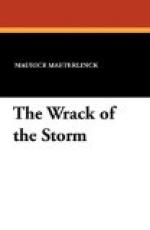Is he thus by nature, or has he been perverted by those who lead him? Have the rulers dragged the whole nation after them, or has the whole nation driven its rulers on? Did the rulers make the nation like unto themselves, or did the nation select and support them because they resembled itself? Did the evil come from above or below, or was it everywhere? Here we have the great and obscure point of this terrible adventure. It is not easy to throw light upon it and still less easy to find excuses for it. If our enemies prove that they were deceived and corrupted by their masters, they prove, at the same time, that they are less intelligent, less firmly attached to justice, honour and humanity, less civilized, in a word, than those whom they claimed the right to enslave in the name of a superiority which they themselves have proved not to exist; and, unless they can establish that their errors, perfidies and cruelties, which can no longer be denied, should be imputed only to those masters, then they themselves must bear the pitiless weight. I do not know how they will escape from this predicament, nor what the future will decide, that future which is wiser than the past, even as, in the words of an old Slav proverb, the dawn is wiser than the eve. In the meanwhile, let us copy the prudence of our soldiers, who know what to believe far better than we do.
* * * * *
THE MASSACRE OF THE INNOCENTS
XXIV
THE MASSACRE OF THE INNOCENTS
The Massacre of the Innocents appeared for the first time in 1886, in a little periodical called La Pleiade which some friends and I had founded in the Latin Quarter and which died of inanition after its sixth number. My reason for making room in the present volume for these pages marking a very modest start—they were the first that found their way into print—is not that I am under any delusion as to the merits of this youthful work, in which I had simply aimed at reproducing as best I could the different episodes of a picture in the Brussels Museum, painted in the sixteenth century by Pieter Brueghel the Elder. But it appeared to me that circumstances had made of this humble literary effort a sort of prophetic vision; for it is but too likely that similar scenes must have been repeated in more than one of our unhappy Flemish or Brabant villages and that to describe them as they were lately enacted we should have only to change the name of the butchers and probably, alas, to accentuate their cruelty, their injustice and their hideousness!—M. M.
It was close upon supper-time, that Friday the twenty-sixth day of the month of December, when a little shepherd-lad came into Nazareth, sobbing bitterly.
Some peasants drinking ale in the Blue Lion opened the shutters to look into the village orchard and observed the child running over the snow. They saw that he was Korneliz’ boy and cried from the window:




